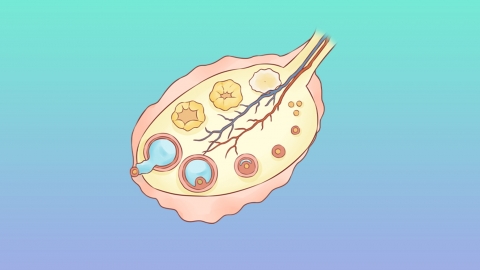What could be the issue if follicles are growing on one side but not on the other?
Under normal circumstances, uneven follicle development—where one follicle grows while the other does not—may be caused by physiological differences in the ovaries, excessive emotional stress, polycystic ovary syndrome (PCOS), diminished ovarian reserve, thyroid dysfunction, or other factors. It is recommended to seek timely medical evaluation to identify the underlying cause and, under a doctor's guidance, improve the condition through general management, medication, and other treatments. A detailed analysis is as follows:

1. Ovarian Physiological Differences: The two ovaries do not always function in perfect synchrony. Occasionally, follicles on one side develop preferentially while the opposite ovary remains in a resting phase, which is a normal physiological phenomenon. Maintaining regular sleep patterns, avoiding late nights, ensuring 7–8 hours of sleep per day, and consuming a balanced diet rich in high-quality protein typically suffice. No special intervention is needed, and subsequent monitoring usually shows normalization.
2. Excessive Emotional Stress: Prolonged anxiety and tension can disrupt the hypothalamic-pituitary-ovarian axis, leading to hormonal imbalances that suppress follicular development on one side. Practicing 20 minutes of meditation or yoga daily, listening to music, or communicating with family and friends to relieve stress can help stabilize emotions and support hormonal recovery.
3. Polycystic Ovary Syndrome (PCOS): Endocrine disorders in PCOS cause an imbalance between follicle-stimulating hormone (FSH) and luteinizing hormone (LH), resulting in limited follicular development, often producing only small follicles. As directed by a physician, medications such as ethinylestradiol/cyproterone acetate tablets, drospirenone/ethinyl estradiol tablets, or spironolactone tablets may be used to regulate hormone levels.
4. Diminished Ovarian Reserve: Reduced ovarian reserve leads to decreased sensitivity of follicles to hormones, causing poor development on one side. Under medical supervision, medications such as estradiol valerate tablets, conjugated estrogens tablets, or estradiol/drospirenone tablets may be prescribed to supplement estrogen, improve ovarian function, and promote normal follicular development.
5. Thyroid Dysfunction: Both hyperthyroidism and hypothyroidism can interfere with hormone metabolism and disrupt follicular development, leading to asymmetric growth. For hyperthyroidism, medications such as methimazole tablets, propylthiouracil tablets, or carbimazole tablets may be prescribed. For hypothyroidism, levothyroxine sodium tablets are typically required to bring thyroid function back to normal levels.
In daily life, avoid overexertion and engage in moderate physical activities such as jogging or skipping rope to enhance overall health. Avoid tobacco, alcohol, and other harmful substances, and regularly monitor follicular development. Scientific lifestyle adjustments can help maintain stable reproductive endocrine function.




